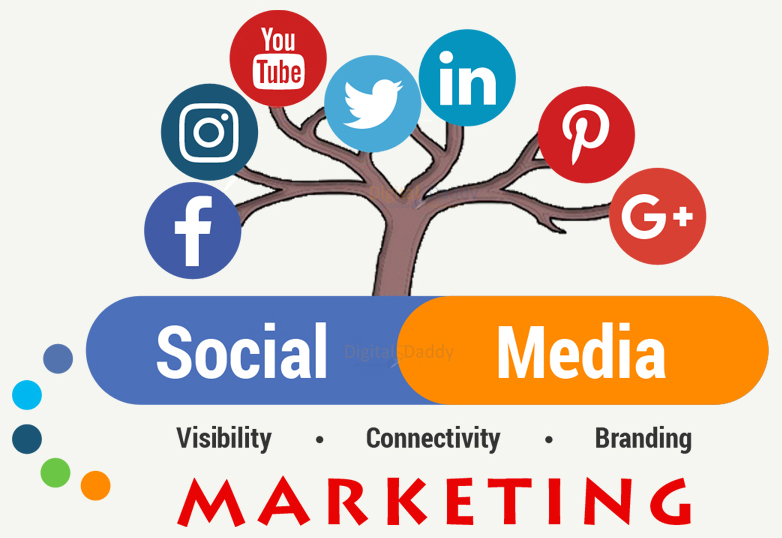Social Media Marketing

Introduction
In today’s interconnected world, social media has become an integral part of everyday life, with billions of people worldwide using platforms like Facebook, Instagram, Twitter, LinkedIn, and TikTok to connect, share, and engage with content. Social media marketing harnesses the power of these platforms to promote products or services, build brand awareness, and drive customer engagement. This paper explores the concept of social media marketing, its benefits, strategies, and best practices for success.
Understanding Social Media Marketing
Social media marketing involves using social media platforms to reach and engage with your target audience. It encompasses a range of activities, including creating and sharing content, running ads, interacting with followers, and analyzing performance metrics. Social media marketing allows businesses to connect with customers on a more personal level, build brand loyalty, and drive business growth.
Key Components of Social Media Marketing
Content Creation: Content is the cornerstone of social media marketing. It includes a variety of formats, such as text posts, images, videos, infographics, and live streams. Quality content is essential for attracting and engaging your audience on social media.
Audience Engagement: Social media marketing is a two-way conversation. It’s important to engage with your audience by responding to comments, messages, and mentions, asking questions, and soliciting feedback. This helps build relationships and foster a sense of community around your brand.
Paid Advertising: Most social media platforms offer advertising options that allow businesses to reach a larger audience and target specific demographics, interests, and behaviors. Paid advertising can include sponsored posts, display ads, video ads, and carousel ads.
Analytics and Measurement: Social media analytics provide valuable insights into the performance of your marketing efforts. Metrics such as reach, engagement, clicks, conversions, and ROI help you understand what’s working and what’s not, allowing you to optimize your strategy accordingly.
Benefits of Social Media Marketing
Increased Brand Awareness: Social media provides a platform for businesses to reach a wider audience and increase brand visibility. By regularly sharing content and engaging with followers, businesses can raise awareness of their brand and attract new customers.
Improved Customer Engagement: Social media allows businesses to interact with customers in real-time, responding to questions, addressing concerns, and providing support. This helps build trust and loyalty among customers and enhances the overall customer experience.
Targeted Advertising: Social media platforms offer advanced targeting options that allow businesses to reach specific demographics, interests, and behaviors. This enables businesses to tailor their advertising messages to the right audience, increasing the effectiveness of their campaigns.
Cost-Effectiveness: Compared to traditional forms of advertising, such as TV or print ads, social media marketing is relatively cost-effective. Many social media platforms offer advertising options that are affordable for businesses of all sizes, with flexible budgeting options and measurable results.
Access to Insights: Social media analytics provide businesses with valuable insights into their audience’s behavior, preferences, and interests. This data can inform marketing strategies, content creation, and product development, helping businesses better serve their customers.
Social Media Marketing Strategies
Define Your Goals: Start by defining your goals for social media marketing. Are you looking to increase brand awareness, drive website traffic, generate leads, or boost sales? Your goals will guide your strategy and tactics.
Know Your Audience: Understand your target audience, including their demographics, interests, and pain points. This will help you create content and messaging that resonates with them and drives engagement.
Choose the Right Platforms: Not all social media platforms are created equal. Choose the platforms that are most relevant to your target audience and align with your business objectives. For example, LinkedIn is ideal for B2B marketing, while Instagram is popular among younger demographics.
Create Quality Content: Focus on creating quality content that provides value to your audience. This can include educational articles, entertaining videos, behind-the-scenes glimpses, user-generated content, and product demonstrations.
Engage with Your Audience: Actively engage with your audience by responding to comments, messages, and mentions. Encourage conversation, ask questions, and solicit feedback to foster a sense of community around your brand.
Utilize Paid Advertising: Consider using paid advertising to amplify your reach and target specific demographics. Experiment with different ad formats, targeting options, and messaging to find what works best for your business.
Monitor and Measure: Regularly monitor the performance of your social media marketing efforts using analytics tools provided by each platform. Track key metrics like reach, engagement, clicks, conversions, and ROI to gauge the effectiveness of your strategy and make data-driven decisions.
Best Practices for Social Media Marketing
Be Authentic: Authenticity is key to building trust and credibility on social media. Be genuine, transparent, and human in your interactions with your audience.
Be Consistent: Consistency is important for maintaining a strong presence on social media. Post regularly, engage with your audience consistently, and stick to your brand voice and messaging.
Provide Value: Focus on providing value to your audience through your content and interactions. Offer useful information, solve problems, entertain, and inspire your audience to keep them engaged and coming back for more.
Stay Relevant: Keep up with current trends, events, and conversations in your industry and on social media. Share timely and relevant content that resonates with your audience and shows that your brand is in tune with the latest developments.
Monitor Your Reputation: Monitor mentions of your brand on social media and respond promptly to both positive and negative feedback. Address customer concerns and complaints publicly and professionally to demonstrate your commitment to customer satisfaction.
Conclusion
Social media marketing offers businesses a powerful way to connect with their audience, build brand awareness, and drive business growth. By understanding the key components, benefits, strategies, and best practices of social media marketing, businesses can leverage these platforms effectively to achieve their marketing goals. With the right approach, social media marketing can be a valuable addition to any business’s digital marketing toolkit, helping them reach and engage with their audience in meaningful and impactful ways.
Get proposal for your Company
sent mail on:- Info@amazingAI.in